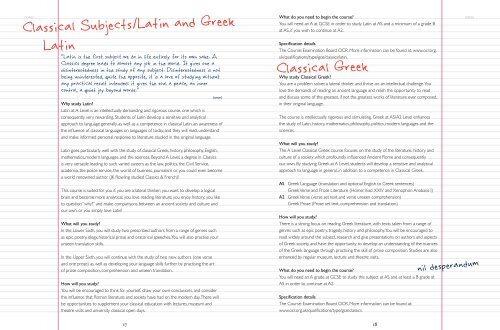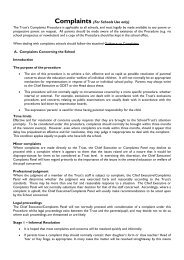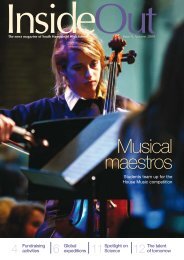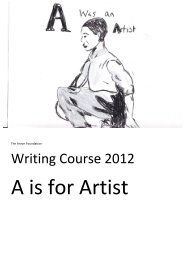SHHS Sixth Form Prospectus - South Hampstead High School
SHHS Sixth Form Prospectus - South Hampstead High School
SHHS Sixth Form Prospectus - South Hampstead High School
You also want an ePaper? Increase the reach of your titles
YUMPU automatically turns print PDFs into web optimized ePapers that Google loves.
notes<br />
Classical Subjects/Latin and Greek<br />
Latin<br />
“Latin is the first subject we do in life entirely for its own sake. A<br />
Classics degree leads to almost any job in the world. It gives one a<br />
disinterestedness in the study of any subject. Disinterestedness is not<br />
being uninterested, quite the opposite, it is a love of studying without<br />
any practical result intended: it gives the soul a peace, an inner<br />
control, a quiet joy beyond words.”<br />
(anon)<br />
Why study Latin<br />
Latin at A Level is an intellectually demanding and rigorous course, one which is<br />
consequently very rewarding. Students of Latin develop a sensitive and analytical<br />
approach to language generally, as well as a competence in classical Latin, an awareness of<br />
<br />
and make informed personal response to literature studied in the original language.<br />
<br />
mathematics, modern languages and the sciences. Beyond A Level, a degree in Classics<br />
is very versatile leading to such varied careers as the law, politics, the Civil Service,<br />
academia, the police service, the world of business, journalism or you could even become<br />
<br />
This course is suited for you if: you are a lateral thinker; you want to develop a logical<br />
brain and become more analytical; you love reading literature; you enjoy history; you like<br />
to question “why” and make comparisons between an ancient society and culture and<br />
our own; or you simply love Latin!<br />
What will you study<br />
In the Lower <strong>Sixth</strong>, you will study two prescribed authors from a range of genres such<br />
as epic poetry, elegy, historical prose and oratorical speeches. You will also practise your<br />
unseen translation skills.<br />
In the Upper <strong>Sixth</strong>, you will continue with the study of two new authors (one verse<br />
and one prose) as well as developing your language skills further by practising the art<br />
of prose composition, comprehension and unseen translation.<br />
How will you study<br />
You will be encouraged to think for yourself, draw your own conclusions, and consider<br />
<br />
be opportunities to supplement your classical education with lectures, museum and<br />
theatre visits and university classical open days.<br />
What do you need to begin the course<br />
<br />
<br />
<br />
<br />
<br />
Classical Greek<br />
Why study Classical Greek<br />
You are a problem solver, a lateral thinker and thrive on an intellectual challenge. You<br />
love the demands of reading an ancient language and relish the opportunity to read<br />
and discuss some of the greatest, if not the greatest works of literature ever composed,<br />
in their original language.<br />
<br />
the study of Latin, history, mathematics, philosophy, politics, modern languages and the<br />
sciences.<br />
What will you study<br />
<br />
<br />
<br />
<br />
AS <br />
<br />
A2 <br />
<br />
How will you study<br />
<br />
genres such as epic poetry, tragedy, history and philosophy. You will be encouraged to<br />
read widely around the subject, research and give presentations on authors and aspects<br />
<br />
<br />
enhanced by regular museum, lecture and theatre visits.<br />
What do you need to begin the course<br />
<br />
<br />
<br />
<br />
<br />
notes<br />
nil desperandum<br />
17 18
















